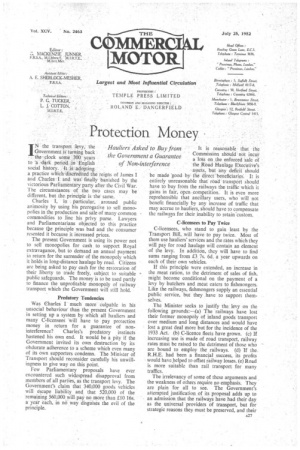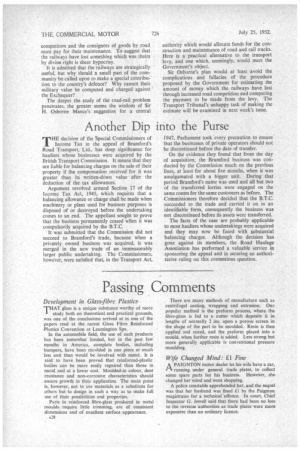Protection Money.
Page 29

Page 30

If you've noticed an error in this article please click here to report it so we can fix it.
iN the transport levy, the Hauliers Aske Government is turning back th G
overntne e
the clock some 300 years to a dark period in English social history. It is adopting.
a practice Which discredited the reigns of James I and .Charles 1.. and was finally banished by the victorious Parliamentary, party after the Civil War. The circunistances of the two cases may be different, but the. principle is -the same, Charles • I, in particular; aroused public animosity by using his prerogative to sell monopolies in the production and sale of many common commodities to line his privy purse. Lawyers and Parliamentarians objected to this practice because tbe principle was bad and the consumer resented it because it increased prices.
The present Government is using its power not to sell monopolies for cash to support Royal extravagance, but to demand an annual payment in return for the surrender of the monopoly which it holds in long-distance haulage by road. Citizens are being asked to pay cash for the restoration Of their liberty to trade freely, subject to suitable public safeguards. The money is to be used partly to finance the unprofitable monopoly of railway transport which the Government will still hold.
Predatory Tendencies Was Charles I much more culpable in his unsocial behaviourthan the present Government in setting up a system by which all hauliers and many C-licensees will have to pay protection money in return for a guarantee of noninterference? Charles's predatory instincts hastened his own end. It would be a pity if the Government invited its own destruction by its obdurate adherence to a scheme which even many of its own supporters condemn. The Minister of Transport should reconsider carefully his unwillingness to give way on this point.
Few Parliamentary proposals have ever encountered such widespread disapproval from members of all parties, as the transport levy. The Government's claim that 340,000 goods vehicles will escape liability and that 520,000 of the remaining 560,000 will pay no more than £10 16s. a year each, in no way disguises the evil of the principle. It is reasonable that the Commission shouldnit incur a loss on the enforced sale of the Rbad Haulage Executive's assets, but any deffcit should be made 'good by the direct beneficiaries: It is entirely unreasonable that road' transport should have to buy from the railways the traffic which it gains in fair, open competition. It is even more reprehensible that ancillary users, who will not benefit financially by any increase of traffic that may accrue to hauliers, should have to compensate the railways for their _inability to retain 'custom.
d to Buy from nt a Guarantee
C-licensees to Pay Twice C-licensees, who stand to gain least by the Transport Bill, will have to pay twice. Most of them use hauliers' services and the rates which they will pay for road haulage will contain an element of the levy. In addition, they will have to find sums ranging from £3 7s. 6d. a year upwards on each of their own vehicles.
If this principle were extended, an increase in the meat ration, to the detriment of sales of fish, might become conditional on the payment of a levy by butchers and meat eaters to fishmongers. Like the railways, fishmongers supply an essential public service, but they have to support themselves.
.The Minister seeks to justify the levy on the following grounds:---,(a) The 'railways have lost their former monopoly of inland goods transport over medium and long distances and would have lost a great deal more but for the incidence of the 1933 Act. (b) C-licence fleets have grown. (c) If increasing use is made of road transport, railway rates must be raised to the detriment of those who are bound to employ the railways. (d)If the R.H.E. had been a financial success, its profits would have .helped to offset railway losses. (e) Road is more suitable than rail transport for many traffics.
The irrelevancy of some of these arguments and the weakness of others require no emphasis. They are plain for all to see. The Government's attempted justification of its proposal adds up to an admission that the railways have hadtheir day as the universal -providers of transport, but for strategic reasons they must be preserved, and their competitors and the consignors of goods by road must pay for their maintenance. To suggest that the railways have lost something which was theirs by divine right is sheer hypocrisy.• It is admitted that the railways are strategically useful, but why should a small part of the community be called upon to make a special contribution to the country's defence? Why cannot their military value be computed and charged against •• the Exchequer?
The deeper. the study of the road-rail problem penetrates, the greater seems the wisdom of Sir H. Osborne Mance's suggestion for a central authority which would allocate funds for the construction and maintenance of road and rail tracks. Here is a practical alternative to the transport levy, and one which, seemingly, would meet the Government's object.
Sir Osborne's plan would at least avoid the complications and fallacies of the procedure proposed by the Government for estimating the amount of money which the railways have lost through increased road competition and computing the payment to be made from the levy. The Transport Tribunal's unhappy task of making the estimate will be examined in next week's issue.




















































































